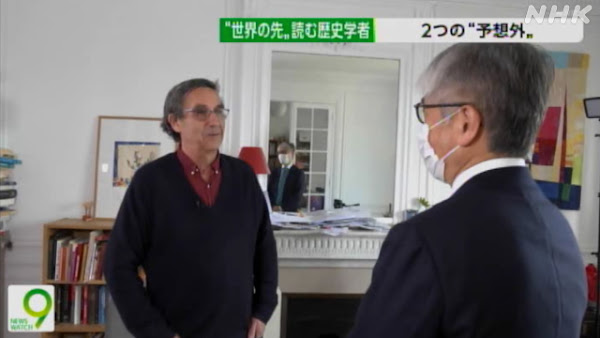Opinions and analyses on US and global security presented by H. Ross Kawamura: a foreign policy commentator; an advocate for liberal interventionism and robust defense policy; a watchful guardian of a world order led by the USA, Europe, and Japan.
Wednesday, May 11, 2022
The Case against Emmanuel Todd’s View on Russia
Renowned French historian Emmanuel Todd had an interview with NHK of Japan in a TV program “News Watch 9” on May 6, about the current war in Ukraine and its impact on Russia. Among some points that he commented in the interview, I was startled to hear that Russia was no longer a serious threat to the West, because this war has revealed appalling weakness of Russian armed forces.
Being militarily weak does not necessarily mean that the threat posed by the actor, whether state or non-state, is negligible. Typically speaking, Islamic terrorists are too weak in terms of raw military power, but the threat they pose to the global community is horribly huge, in view of their strong hatred and grudge to the West. Actually, such hatred and grudge caused the 9-11 attacks. Likewise, Russian President Vladimir Putin is driven by nasty and hateful emotions against the West, and strong will to destroy Westernd democracy, as he initiated his “special military operation” in Ukraine. If Russia is not a serious threat, why are Sweden and Finland bidding to join NATO?
There are the following reasons why the Russian threat is critical, Firstly, Russian troop’s hostility and cruelty to the enemy, including noncombatants, that imperiled the global community are correlated to their poorly disciplined and unprofessional conducts in the battlefield. Their murder, torture, burgling, and rape associated with the war, coincide with their poor logistics, communication, training, command structure, and tactics in the combat. That is to say, Russian armed forces are too savage, and not modernized enough in this century. It is frequently told in the media that Russia’s conduct and strategy are World War II-styled. But I would say that they are so pre-modern as Middle Age Mongolian forces, and brutally impose the Tatar yoke on Ukraine. Paradoxically, Russia is a terrible threat, because they are weak.
Secondly, Putin does not hesitate to saber-rattle nuclear weapons, which breaks the fundamental assumption of MAD. That erodes the global nuclear arms control regime. As a result, belligerent and autocratic proliferators, such as North Korea, would be emboldened. Furthermore, China could overturn its no-preemptive strike strategy, if Russia’s intimidation were effective to deter Western engagement to assist Ukraine. Since Russian conventional forces are too weak and unsystematic, they may have to depend on nuclear, biological, and chemical weapons in the end. Again, Russia is a terrible threat, because they are weak.
Thirdly, Russia has interfered in the elections in Europe and the United States to weaken and destroy Western democracy. This is a hybrid warfare against the West. The Kremlin agitates anti-globalist mobs to vote for far right candidates and agendas. Notably, Brexit and the Trump phenomenon shocked the global community. On the other hand, Russia provokes far left uprisings as well, because they are also resentful to globalist Western establishment. As a European, Todd is in a good position to understand the threat of Russian penetration into domestic politics in the West. In the last presidential election in France, Marine Le Pen gained the ground gradually, though she lost against Emmanuel Macron.
Lastly, Russian aggression of Ukraine is a critical challenge to international rules and norms. As cited the Atlantic Charter, “Territorial adjustments must be in accord with the wishes of the peoples concerned”, which is a key principle of the United Nations. The Russian troops do not abide by the code of conduct of modern international relations to respect national sovereignty, because they are extremely pre-modern. We, global citizens, should be well-aware that Russia is a peace breaker from every point that I mentioned in this article. A weak enemy is no less a critical threat than a strong enemy.
Subscribe to:
Comments (Atom)
